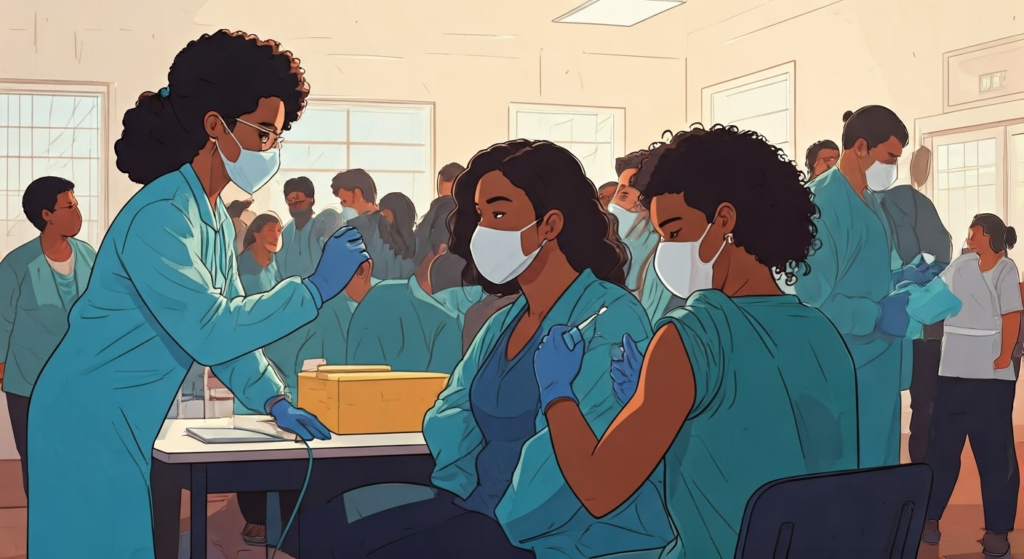Understanding Vaccines & Immunizations: A Comprehensive Guide

Key Highlights
- Vaccines are essential for protecting individuals and communities from infectious diseases.
- They work by triggering the body’s immune system to recognize and fight specific germs.
- Vaccines are rigorously tested for safety and effectiveness before being made available to the public.
- Staying up-to-date with recommended vaccination schedules for all ages is crucial.
- Common vaccine-preventable diseases include measles, mumps, rubella, influenza, and HPV.
Introduction
Vaccines are very important for keeping public health safe. They help our immune system fight off infectious diseases. Getting immunized, which means receiving vaccines, has helped lower the number of many diseases we can prevent. This guide looks at how vaccines work, why they matter, and why it is vital to keep your vaccinations current for both you and your community.
The Science Behind Vaccines

Vaccines help the body learn to fight disease without getting sick. They use weakened or inactive forms of germs to safely expose our body. This lets the immune system step in and start an immune response by creating antibodies. The body will remember this information. If the same germ comes back later, the immune system can quickly recognize and attack it.
How Vaccines Work: An Overview
When you get a vaccine, your immune system notices the harmless parts of it as if they were germs. This prompts your immune response, like what happens during a real infection. Special cells in your body make antibodies. These antibodies are made to fight the weak or inactive germs in the vaccine. Because of this, your immune system gets stronger. It remembers this meeting and gets ready to protect you from being attacked by those same germs in the future. This way, if you do face the actual disease, your body can react more quickly and effectively.
Types of Vaccines and How They Are Made

Different types of vaccines are made to fight different diseases. Some examples include live-attenuated vaccines, inactivated vaccines, and subunit vaccines. Live-attenuated vaccines use a weaker form of the germ. Inactivated vaccines, on the other hand, use killed versions of the germ. Subunit vaccines only contain certain parts of the germ, like proteins or sugars. Each vaccine is carefully tested to make sure it is safe and works well against the disease it targets. Scientists work hard to follow strict safety rules when they make vaccines. This helps protect public health.
The Importance of Immunizations
Immunizations are vital for public health. They provide a safe way to prevent diseases. Vaccines protect not just individuals but also help the whole community. When many people get vaccinated, it significantly lowers the number of infectious diseases. This shows just how important vaccines are in keeping everyone healthy.
The Role of Immunizations in Public Health
Immunizations help protect people and are very important for public health because of herd immunity, also known as community immunity. When many people in a group get immunized against a disease, it stops the disease from spreading easily. This protection is very important for those who cannot get vaccines because of health problems or weak immune systems. It shows how health is connected in a community. By keeping immunization rates high, communities can better control the spread of diseases and keep the most vulnerable safe.
How Immunizations Prevent Diseases
Immunizations are the best protection against serious diseases like measles, mumps, rubella, hepatitis, and HPV. Vaccines help your immune system recognize and fight these germs before they can make you sick. They do this by using a weak or inactive version of the germ, which helps your body produce antibodies. This way, you’re ready to protect yourself. This effective way of preventing diseases has worked well to reduce the number and seriousness of many infectious diseases. Vaccinations help keep public health safe all around the world.
Navigating Vaccine Schedules
Knowing the vaccine timelines is very important. It helps keep people safe from diseases that can be prevented. These timelines are carefully created using scientific facts. They show the best ages to get certain vaccines. Following these timelines helps vaccines work better. It also helps people build immunity at the right moments in their lives.
Understanding the CDC’s Vaccine Schedule for Children and Adults
The Centers for Disease Control and Prevention (CDC), in collaboration with the American Academy of Pediatrics (AAP), publishes a comprehensive recommended vaccination schedule for children and adults in the United States. This schedule ensures that individuals receive vaccines at the optimal time for developing immunity.
| Age Group | Recommended Vaccines |
|---|---|
| Birth – 6 years | HepB, RV, DTaP, Hib, PCV13, IPV, MMR, Varicella, HepA, IIV (Yearly) |
| 7 – 18 years | Tdap, HPV, MenACWY, MenB (Optional), IIV (Yearly) |
| Adults | Td (Booster every 10 years), MMR, Varicella, Zoster, Influenza (Yearly), Pneumococcal, Other vaccines based on health conditions and risk factors. |
Following this schedule is essential for maximizing protection for individuals and communities. Consult with your healthcare provider to determine the most current and appropriate vaccine schedule based on your individual circumstances.
The Importance of Staying Up-to-Date with Vaccinations
Staying updated with vaccinations is important for both personal and community immunity. Vaccines can lose their effectiveness over time. That’s why it’s key to follow the recommended booster schedules to keep up protection. This effort helps stop disease outbreaks and supports public health. It’s a good idea to talk with your healthcare provider. They can check your vaccination history and help you ensure you have all the needed vaccines. Keeping high immunization rates is essential to prevent the return of diseases that vaccines can stop. By being aware and taking steps about vaccinations, everyone can help keep themselves and their communities healthy.
Conclusion
In conclusion, knowing about vaccines and immunizations is important for protecting public health. When we understand how vaccines work and the importance of getting them, we can help reduce the spread of diseases. It is very important to get vaccinated, both for children and adults, and to follow the recommended schedules. Learning about the science behind vaccines helps people make good choices about their health. By supporting immunizations and following vaccination rules, we help create a healthier and safer community for all. If you have questions about vaccines, check our FAQ section or talk to healthcare professionals for help.
Frequently Asked Questions
What Are the Most Important Vaccines for Children?
Some key vaccines for kids are MMR, which helps protect against measles, mumps, and rubella. DTaP is another important vaccine. The HPV vaccination is crucial to guard against HPV-related cancers. Kids should also get the influenza (flu) vaccine and the varicella (chickenpox) vaccine.
Are There Any Side Effects to Vaccinations?
Vaccines go through strict tests to ensure they are safe. Some people might have mild side effects such as soreness or redness where they got the shot. However, serious side effects are uncommon. If you have questions or worries about vaccine safety or the risk of its complications, talk to your healthcare provider or local health departments.
https://www.cdc.gov/vaccines/adults/index-sp.html
https://www.cdc.gov/vaccines/hcp/acip-recs/general-recs/contraindications.html
https://www.cdc.gov/vaccines/hcp/vaccines-us/shortages-delays.html

